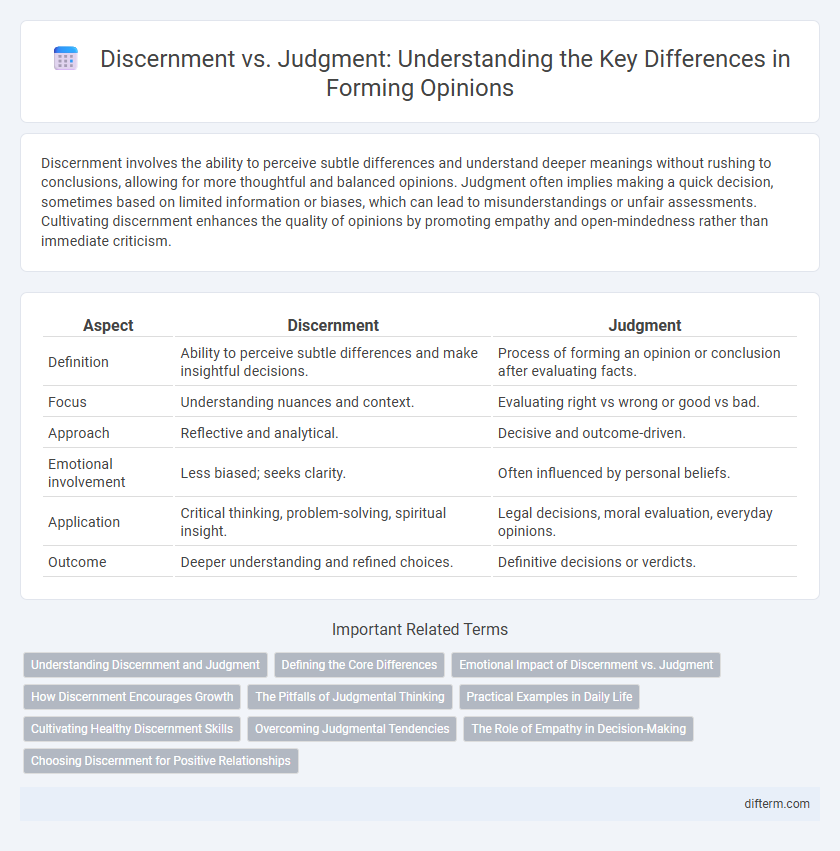Discernment involves the ability to perceive subtle differences and understand deeper meanings without rushing to conclusions, allowing for more thoughtful and balanced opinions. Judgment often implies making a quick decision, sometimes based on limited information or biases, which can lead to misunderstandings or unfair assessments. Cultivating discernment enhances the quality of opinions by promoting empathy and open-mindedness rather than immediate criticism.
Table of Comparison
| Aspect | Discernment | Judgment |
|---|---|---|
| Definition | Ability to perceive subtle differences and make insightful decisions. | Process of forming an opinion or conclusion after evaluating facts. |
| Focus | Understanding nuances and context. | Evaluating right vs wrong or good vs bad. |
| Approach | Reflective and analytical. | Decisive and outcome-driven. |
| Emotional involvement | Less biased; seeks clarity. | Often influenced by personal beliefs. |
| Application | Critical thinking, problem-solving, spiritual insight. | Legal decisions, moral evaluation, everyday opinions. |
| Outcome | Deeper understanding and refined choices. | Definitive decisions or verdicts. |
Understanding Discernment and Judgment
Discernment involves the ability to perceive subtle differences and make thoughtful decisions based on insight and intuition, whereas judgment often refers to forming an opinion or conclusion that may be more immediate or less reflective. True discernment requires a deeper level of understanding, analyzing context, motives, and underlying truths beyond surface appearances. Developing discernment enhances critical thinking and emotional intelligence, leading to more balanced and fair evaluations compared to quick judgments.
Defining the Core Differences
Discernment involves the capacity to perceive subtle distinctions and deeper meanings beyond surface details, emphasizing insight and understanding. Judgment refers to forming conclusions or opinions, often based on evaluating evidence and making decisions, which can be influenced by biases and assumptions. The core difference lies in discernment's focus on nuanced perception versus judgment's emphasis on evaluative decision-making.
Emotional Impact of Discernment vs. Judgment
Discernment fosters emotional clarity by encouraging thoughtful analysis and empathy, reducing impulsive reactions and fostering understanding. Judgment often triggers emotional defensiveness and conflict by imposing rigid evaluations without considering nuances. The emotional impact of discernment is generally calming, while judgment can increase stress and relational tension.
How Discernment Encourages Growth
Discernment fosters growth by promoting thoughtful evaluation rather than snap judgment, allowing individuals to consider multiple perspectives and deeper insights before forming opinions. This mindful approach cultivates emotional intelligence, enabling personal and interpersonal development. Embracing discernment over judgment helps to build resilience, open-mindedness, and a continuous learning mindset.
The Pitfalls of Judgmental Thinking
Judgmental thinking often leads to snap decisions based on incomplete information, fostering misunderstanding and conflict in interpersonal relationships. The pitfalls include reinforcing biases and preventing open-mindedness, which hinders personal growth and empathy. Developing discernment involves critical thinking and emotional intelligence, allowing for more nuanced and compassionate evaluations of situations and people.
Practical Examples in Daily Life
Discernment involves carefully evaluating situations before making decisions, such as distinguishing trustworthy advice from misleading information when managing personal finances. Judgment often refers to the final decision or opinion formed, like choosing whether to accept a job offer based on available criteria. Practicing discernment fosters critical thinking and better outcomes in everyday choices, while judgment solidifies those reflections into actionable conclusions.
Cultivating Healthy Discernment Skills
Cultivating healthy discernment skills involves developing the ability to evaluate information critically and make balanced decisions based on evidence and intuition. Unlike judgment, which often implies a final and sometimes harsh conclusion, discernment emphasizes understanding context and recognizing nuances. Strengthening this skill enhances emotional intelligence and fosters open-mindedness in complex situations.
Overcoming Judgmental Tendencies
Overcoming judgmental tendencies requires cultivating discernment, which involves thoughtful evaluation rather than impulsive criticism. Emphasizing empathy and self-awareness strengthens the ability to distinguish between constructive insight and harsh judgment. Developing discernment fosters positive relationships and encourages open-minded perspectives.
The Role of Empathy in Decision-Making
Empathy enhances discernment by allowing individuals to understand diverse perspectives and emotions, fostering more nuanced and compassionate decision-making. Unlike judgment, which often involves a fixed evaluation, discernment informed by empathy promotes flexibility and depth in assessing situations. This empathetic approach leads to decisions that respect others' experiences and contribute to more ethical and effective outcomes.
Choosing Discernment for Positive Relationships
Choosing discernment over judgment fosters empathy and strengthens positive relationships by encouraging understanding rather than criticism. Discernment allows individuals to evaluate situations with mindfulness and compassion, promoting open communication and trust. This approach reduces conflict and supports emotional intelligence, essential for meaningful connections.
discernment vs judgment Infographic

 difterm.com
difterm.com